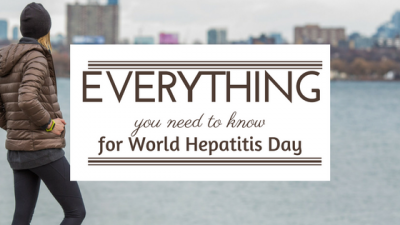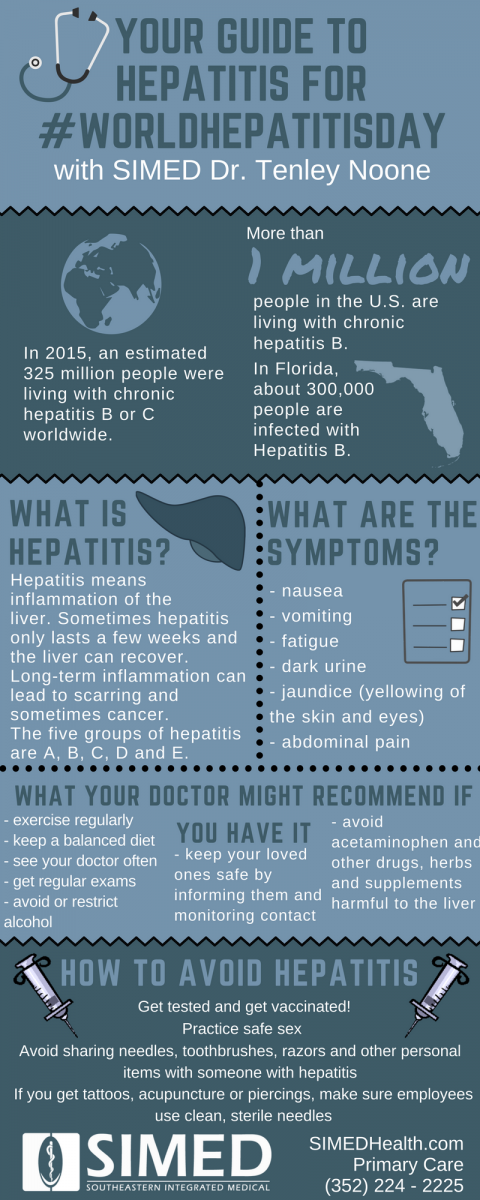
Did you know about 300,000 Floridians are infected with Hepatitis C? Of those, about 210,000 people will develop chronic liver disease. That’s enough people to fill the University of Florida football stadium more than twice.
World Hepatitis Day, July 28th, brings awareness to a disease that infects an estimated 325 million people worldwide, most of whom don’t even know they have it.
Hepatitis can be a silent killer, but over 95 percent of people with hepatitis C can now be completely cured within two to three months.
We spoke with Dr. Tenley Noone, a practicing Family Medicine physician at SIMED, to learn more about what hepatitis is, how to avoid it and how it’s treated.

What is Hepatitis?
Hepatitis means inflammation of the liver. Sometimes hepatitis only lasts a few weeks and the liver can recover; however, long-term inflammation can lead to mild scarring (fibrosis), advanced scarring (cirrhosis) and sometimes cancer.
There are five main types of viruses known to cause hepatitis identified by the letters: A, B, C, D and E. While all cause liver disease, they cause different degrees of illness and liver damage.
Hepatitis B and C lead to chronic diseases including liver cancer.
Hepatitis A and B are the most common vaccine-preventable diseases that affect travelers who visit areas where these viruses are highly prevalent including Africa, India, Central and South America, the Middle East and some parts of Eastern Europe and Asia.
What are the Symptoms of Hepatitis?
“A hepatitis infection can occur with limited or no symptoms or may be very mild and appear similar to a ‘tummy bug’ with nausea and vomiting and abdominal pain. However, sometimes an infection will cause people to develop jaundice (yellowing of the skin and eyes), dark urine and fatigue,” Dr. Noone shared.
How do you get Hepatitis?
People get hepatitis viruses A and E most commonly by ingesting contaminated food or water. Hepatitis A can also be spread sexually.
Hepatitis B, C and D usually occur as a result of direct infection from body fluids like blood, saliva or semen, typically through unprotected sex, from contaminated needles including tattoos, acupuncture or piercings and from blood transfusions before 1992.
Hepatitis B can pass from a mother to a baby at birth and between family members through contact of bodily fluids from sharing personal items like razors, toothbrushes and nail clippers or from sharing drinks and food.
People can also get Hepatitis A and B when traveling to places where the virus is highly prevalent.
How can you avoid Hepatitis?
“Get tested and get vaccinated!” Dr. Noone exclaimed.
Practice preventative measures to protect yourself from developing the condition, and practice safe sex.
“If you get tattoos, acupuncture or piercings, make sure the employees use clean and sterile needles. You should also avoid sharing needles, toothbrushes, razors or other personal items with someone who has a hepatitis infection,” Dr. Noone warned.
What should you do if you think you have Hepatitis?
“If you think you have hepatitis or want to be screened, please talk with your doctor,” Dr. Noone advised.
Doctors screen for hepatitis through blood tests.
Blood donation centers will also screen for hepatitis A, B and C when you donate blood, and the health department will also provide testing.
How is Hepatitis treated?
Most people with hepatitis A and E get well on their own after a few days to a few weeks; however, a doctor might advise abstaining from alcohol and avoiding certain medication.
Hepatitis B and C are treated with drugs given through liver specialists.
“We can now cure over 95 percent of hepatitis C infections, but we don’t yet have a cure for hepatitis B,” Dr. Noone explained.
Getting vaccines to prevent hepatitis A and B is the best option.
How prevalent is Hepatitis?
While about 300,000 Floridians have hepatitis C, most of them are unaware of their infection. According to the Florida Department of Health, about 70 percent of those infected will develop chronic liver disease with an increased risk for liver failure.
A World Health Organization report indicates over one million people in the United States are living with chronic HBV (hepatitis B) infections.
What is it like to live with Hepatitis?
“Living with hepatitis can be challenging. You need to keep yourself healthy, exercise regularly, keep a balanced diet, see your doctor often and get regular exams,” Dr. Noone explained.
Doctors will most likely recommend people with hepatitis avoid or restrict alcohol intake and avoid acetaminophen and other drugs, herbs or supplements that can harm the liver.
People with hepatitis should inform sexual partners about their status, practice safe sex and avoid sharing toothbrushes, razors, needles, syringes, nail files, clippers, scissors or any object that may come into contact with their blood or body fluids.
Dr. Noone also recommends they avoid sharing food that has been in their mouth and pre-chewing food for babies.
In addition to physical symptoms, hepatitis often causes emotional stress, so Dr. Noone suggests you keep an open dialogue with loved ones and your medical team if you have hepatitis.
How has the treatment of Hepatitis changed over time?
While hepatitis B chronic infections still can’t be cured, they can be treated.
Very recently, new drugs have emerged for hepatitis C, and we can now cure most cases of it.
“This is a very exciting time in medicine for hepatitis C because only 25 years ago these infected patients were largely thought to be incurable,” Dr. Noone stated.
How difficult or easy is it to treat Hepatitis?
Acute or short-lived infections are usually easy to treat, but some patients can get very sick and need hospitalization, and a small percentage of patients do not survive.
Chronic infections with hepatitis B cannot yet be cured, but they can be treated by drugs and sometimes by a liver transplant.
“We do not yet understand why some infections become chronic and why some people get very sick and others do not,” Dr. Noone confided.
Most chronic hepatitis C infections are now treated with 4 to 8 weeks of medication, but some patients still cannot be cured and might require a liver transplant.
“Identifying the patients we need to treat is the first step in the eradication of certain hepatitis viruses,” Dr. Noone explained.
If you believe you or someone you know has hepatitis, contact your primary care doctor today.
Dr. Noone sees patients as a primary care physician at SIMED’s Ocala and McIntosh locations. For an appointment specifically with Dr. Noone, in Ocala, call 352-401-7575, or in McIntosh, call 352-224-2525 or request an appointment through SIMEDHealth.com.
To schedule an appointment with a SIMED primary care physician, call 352-224-2225 for our Gainesville, Ocala, Chiefland, Lady Lake and McIntosh locations.